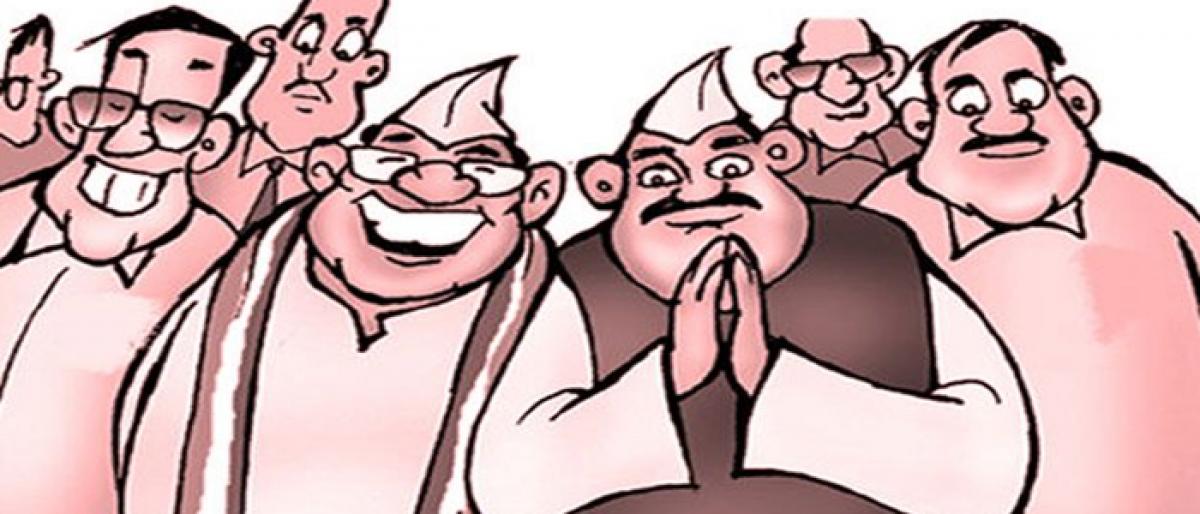Live
- Sudanese army recaptures capital of Sinnar State in central Sudan
- Kishkindha Kaandam Review: Some movies prove not to compromise in having a good cinematic experience and this is one of them
- Son-rise: Hemant Soren grows taller as tribal leader, makes father proud
- ISL 2024-25: 10-man NorthEast United FC hold on to take three points vs Punjab FC
- BGT 2024-25: Jaiswal’s application, commitment to form a partnership was so impressive, says Gilchrist
- BGT 2024-25: Personally, I am very happy with my performance, says Harshit Rana
- Pakistan's Lahore remains world's most polluted city despite light drizzle
- Asha Nautiyal retains Kedarnath for BJP, to be back as MLA after 12 years
- India leads world in science, innovation research: Minister
- Flash flood in Indonesia's South Tapanuli claims two lives
Just In

It is believed that transparency and free access to information can root out corruption and malfeasance in government This article finds that the introduction of asset disclosure rules for candidates for political office in India in November 2003 led to weeding out of bad politicians by encouraging exit from politics and increasing the likelihood of incumbents being reelected
It is believed that transparency and free access to information can root out corruption and malfeasance in government. This article finds that the introduction of asset disclosure rules for candidates for political office in India in November 2003 led to weeding out of ‘bad’ politicians by encouraging exit from politics and increasing the likelihood of incumbents being re-elected.
“Sunlight,” Justice Louis Brandeis famously wrote, “is said to be the best of disinfectants.” It’s an alluring notion – that transparency and free access to information will root out corruption and malfeasance in government.
One mechanism by which transparency can have a cleansing impact in democratic regimes is by giving voters the information they need to eject dishonest or incompetent politicians. This includes information on the politicians themselves – it should raise suspicions if a politician, earning an official salary of a few thousand dollars a year, is discovered to be living in a million-dollar mansion and driving a Mercedes.
This type of reasoning has led governments worldwide to require asset disclosures of candidates for political office at various levels (Djankov et al. 2010). By compelling politicians to reveal their wealth at re-election time, the public can assess whether they profited from holding office, and allow journalists and civil society organisations to better dig into where their wealth came from. As the leading anti-corruption organisation – Transparency International – put it, asset disclosures “allow civil society to hold leaders to account” (Transparency International, 2013).
In a recent study, my co-authors and I assess whether these high-minded ideas translated into genuine accountability amidst the hardball realities of Indian state-level politics (Fisman et al. 2017). Our analysis provides tentative support for the sunshine-as-disinfectant view of political accountability – exploiting the advent of asset disclosure rules in November 2003, we find that disclosures lead politicians to exit politics at higher rates. We also find that the incumbents that choose to stand for re-election are considerably more likely to be re-elected, consistent with disclosure requirements weeding out ‘bad’ politicians.
Studying the effects of electoral institutions is often difficult, because change happens for a reason, which can confound any change one subsequently observes. For example, governments that are serious about accountability will be more apt to introduce disclosure laws. So if we find that the passage of disclosure rules is associated with better accountability, it very plausibly reflects the changing priorities of government more broadly rather than the effect of disclosure in particular.
In our analysis we are able to sidestep this problem by focussing on state assembly elections in India, which take place at different times in different states. To illustrate, consider the two northern states of Himachal Pradesh and Rajasthan. Both held elections in 2003 but, owing to long-standing differences in their electoral cycles, voting in Himachal Pradesh took place in March, but not until November in Rajasthan.
Since nationwide asset disclosure requirements went into effect in November, politicians in Rajasthan were forced to make disclosures while those in Himachal Pradesh were not. By comparing political outcomes in ‘just-before’ states like Himachal Pradesh to ‘just-after’ states like Rajasthan, we can measure the effects of disclosure as distinct from nationwide trends.
Based on this comparison, we find very little impact on the first election after disclosure laws went into effect. But in the second election, we observed a drop of about 15 percentage points in the fraction of incumbents standing for re-election. Why the lagged effect? A natural interpretation is that there is no stigma associated with wealth – rich businessmen like Michael Bloomberg or Donald Trump who get into politics are not implicated in corruption. But an individual who grows his wealth while in office raises more suspicions – how can one accumulate millions while earning a pittance as a public servant?... Our analysis also points to this political ‘self-selection’ effect leading to better candidates, at least in the eyes of the public…
Role of citizen action
While our findings suggest that Indian voters have benefitted from the greater accountability as a result of politicians’ asset disclosures, it’s far too soon to tell what the longer-term consequences will be, or whether these findings can be expected to generalise to other settings. Most obviously, as politicians grow accustomed to disclosure requirements, they may simply grow more adept at hiding their wealth… Accountability, therefore, requires more than just the use of disclosures by citizens in casting their ballots. Public pressure is necessary to force politicians to make disclosures in the first place.
By: Raymond Fisman
(This article first appeared on VoxDev voxdev.org; Reprinted with permission from Ideas for India-www.ideasforindia.in)

© 2024 Hyderabad Media House Limited/The Hans India. All rights reserved. Powered by hocalwire.com







